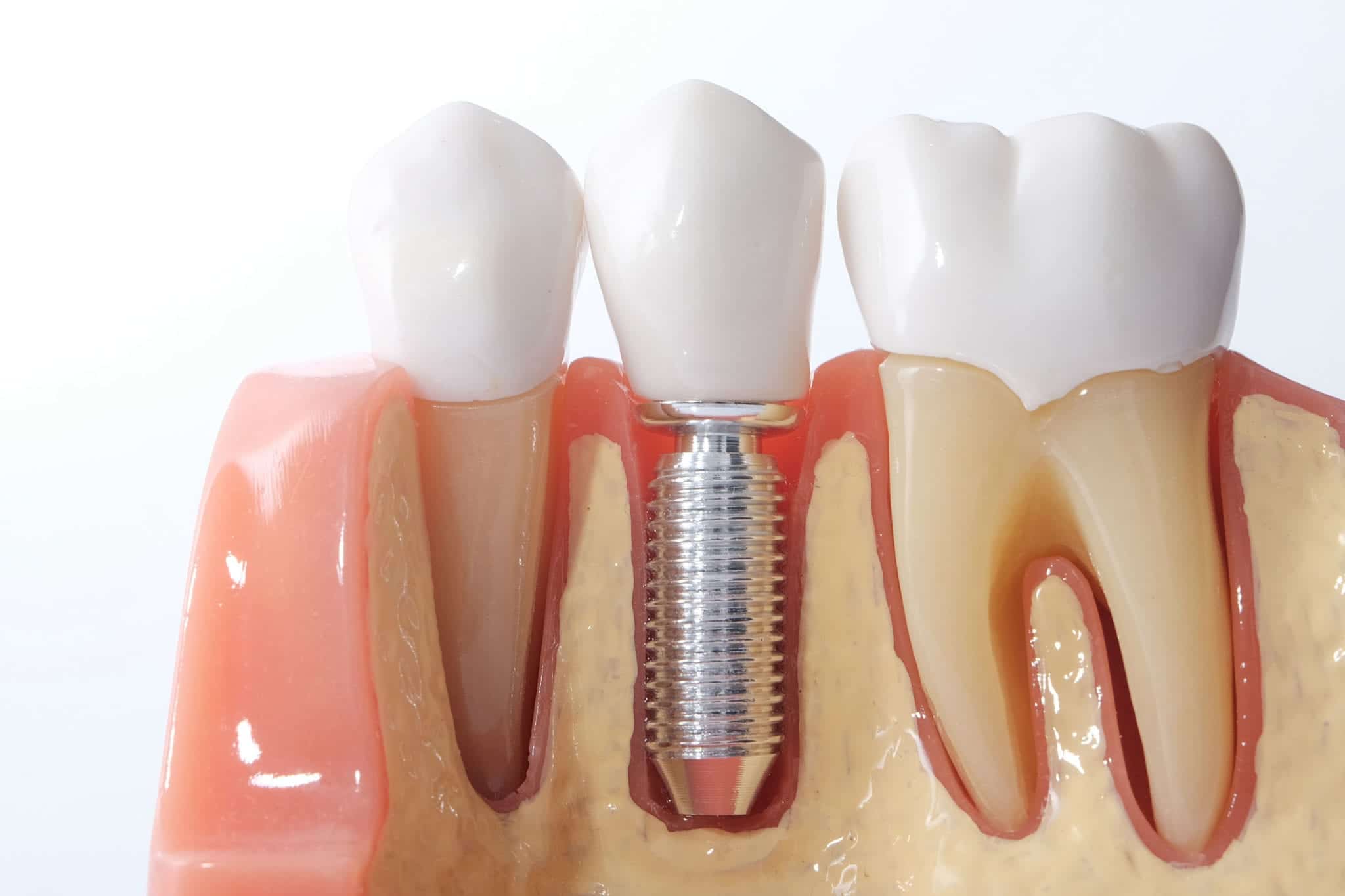
In recent years, the treatment options for tooth replacement have exploded. For anyone missing teeth, this is very good news.
However, the variety of choices can be overwhelming, and making the right choice for your case is often a daunting task.
Therefore, we’ve put together a guide covering how dentures and dental implants work, and the pros and cons of each.
Dental Implants Explained
A dental implant is a permanent prosthetic replacement for a missing tooth. Once you’ve had a dental implant successfully implanted, it looks and feels like a normal tooth, and is permanent.
First, a surgical fixture that looks like a screw or small metal rod is inserted into the jawbone, where it’s allowed to fuse with the bone for a few months in a process known as osseointegration.
Once the implant, which serves as a prosthetic root, has integrated into the jawbone, a prosthetic tooth, which looks similar to a crown, is attached to the implant. This restores not only the function but also the aesthetics of the lost tooth.
Dental Implant Pros and Cons
There are many reasons why dental implants make great sense for anyone who’s lost a tooth. There are also some drawbacks. Let’s take a look at both.
Pros of dental implants include:
- Aesthetics: When complete, a dental implant will look and feel just like a regular tooth.
- Bone health: A dental implant replaces the root of the tooth you’ve lost. This supports the structure of your bone and makes bone loss in your jaw much less likely.
- Durability: Dental implants are virtually permanent. Because the implants are fused into your jawbone, they’re very stable, and with proper care will last a lifetime.
- Function: The titanium post of a dental implant is fused with your jaw, so dental implants stay in place. This means that unlike dentures, chewing is easier, and your speech is not affected.

Cons of dental implants include:
- Lengthy and in-depth process: Getting a dental implant is a time-consuming process, as it often takes up to six months for the dental implant to fuse with your jawbone. This means that dental implants require multiple office visits, and aren’t the best solution for someone seeking a quick fix.
- Infection: Complications of dental implants are rare, especially as technology has improved. However, it’s possible for your gums to become infected after the implant is inserted.
- Additional procedures: In some cases, dental implants may require additional procedures. For example, some patients have experienced bone loss, so they don’t have the bone structure to support the implant, meaning that they will require a bone graft.
- Cost: Although dental implants provide a permanent solution to tooth loss, they’re also more costly than other restorations upfront.
Dentures Explained
Dentures are custom-made, removable false teeth. Depending on how many replacement teeth you need, dentures can be complete or partial. Dentures are affixed by anchoring to remaining teeth, or by denture adhesive. They must be removed and cleaned at night.
Denture Pros and Cons
Dentures are a great option for many patients, but they do have some drawbacks, as well. Let’s look at the pros and cons.
Pros of dentures include:
- Time: Unlike dental implants, dentures require only two office visits, and the entire process takes only 2-6 weeks.
- Cost: Dentures cost substantially less than dental implants.
- Multiple teeth: If you’re missing multiple teeth, or all of your teeth, dentures can be a good option, as you only require two sets (top and bottom) to replace everything. For dental implants, you’ll need a separate implant for each missing tooth.
Cons of dentures include:
- An adjustment period is required: Even though dentures are customized to fit your mouth exactly, wearing them does take some adjustment. You’ll have to get used to how they feel, and how to eat and speak when wearing them. You may experience some discomfort, especially when you first get your dentures.
- Not a permanent solution: Dentures must be removed and cleaned every night, and replaced every 5-8 years.
- Loss of taste: Many dentures cover the roof of your mouth and your bottom gums. This means that up to 70% of your taste sensation can be lost when you eat.
- Problems with speech: Dentures can sometimes shift in the mouth, making clear speech difficult.
Making the Right Choice for You

In the end, there is no right or wrong answer. The right choice for your tooth replacement needs will depend on how many teeth you’re missing, your bone structure, your budget, and many other factors. Your dentist can help you weigh the options and make the best choice for your situation.






